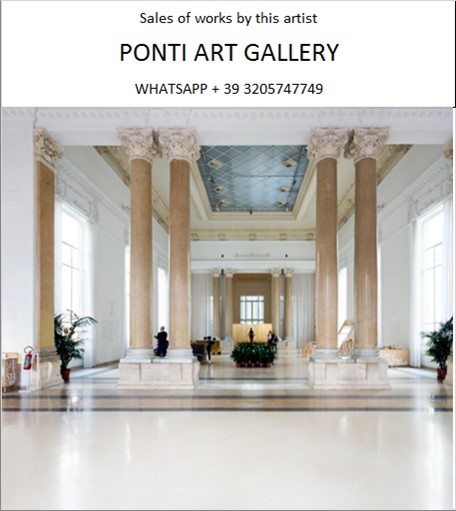Ponti Art Gallery is interested in buying and selling works
of art by this artist.

Yan Pei-Ming Biography
Yan Pei-Ming is a renowned Chinese painter, celebrated for his large-scale, monochromatic portraits that encapsulate the essence of his subjects with vigorous, expressive brushstrokes. Born on December 1, 1960, in Shanghai, China, Yan grew up during the tumultuous period of the Cultural Revolution. His early life was marked by the influence of this socio-political upheaval, which played a significant role in shaping his artistic journey.
The son of a slaughterhouse worker and a factory employee, Yan's childhood was steeped in the working-class environment of Shanghai. Despite the challenges of growing up during a time of great cultural and political strife, Yan discovered his talent for drawing at a young age. His skill was recognized and utilized by the regime, as he was tasked with creating propagandist paintings in the style of Socialist Realism, a form of art that was imported from the Soviet Union to China.
Yan's artistic abilities provided him with a means of expression, especially important given his struggle with stuttering. However, the restrictive nature of the art he was required to produce under the Communist regime left him yearning for creative freedom. This desire for artistic liberation eventually led him to leave China in 1980, along with a group of fellow artists, in search of new opportunities and inspiration.
Upon arriving in France, Yan faced the challenges of adapting to a new culture and language. He settled in Dijon, where he found work as a dishwasher while simultaneously studying French. His determination and hard work paid off when he was admitted to the École Nationale Supérieure des Beaux-Arts in Dijon in 1981. Yan's time at the art school was transformative, allowing him to explore various artistic styles and techniques. He graduated in 1986 and continued his studies at the Institut des Hautes Études en Arts Plastiques in Paris.
Yan's unique approach to portraiture began to take shape during his years in art school. He started creating his signature monumental portraits in 1987, often focusing on the face of Mao Zedong, a figure well-known in France and a symbol of Chinese culture. Yan's choice of Mao as a subject was both a nod to his past and a means of establishing his identity as an artist within his new cultural context.
In 1991, Yan's work gained international recognition with his first solo exhibition at the Centre Pompidou in Paris. His paintings, primarily executed in black and white, reflected his pessimistic view of life and often depicted themes of poverty, war, and death. His subjects ranged from political figures and celebrities to ordinary people affected by societal and geopolitical conflicts.
Yan's career continued to flourish throughout the 1990s and 2000s, with his work being featured in solo and group exhibitions worldwide, including the Venice Biennale, the Sevilla Biennale, and the Istanbul Biennial. His art is held in prestigious public collections such as the Centre Georges Pompidou, the Honolulu Museum of Art, the National Gallery of Australia, and the Shanghai Art Museum.
In 2009, Yan's work reached a new level of acclaim with his exhibition at the Louvre, "The Funeral of Mona Lisa." This provocative show featured a series of large canvases, including a replica of the Mona Lisa, portraits of his father, and self-portraits, all exploring themes of mortality and legacy.
Yan's art is characterized by his use of a limited color palette, often employing black, white, and red to create striking contrasts and focus the viewer's attention on the subject and composition. His expressive brushstrokes, which appear almost abstract up close but coalesce into sharper images from a distance, blur the lines between reality and imagination.
Throughout his career, Yan has continued to explore the relationship between image and reality, history and contemporaneity, and personal and collective narratives. His work is a testament to his deep and passionate reflection on painting and its role in today's art world. As a bridge between Eastern and Western cultures, Yan Pei-Ming's art offers a powerful commentary on the human condition, the passage of time, and the enduring impact of historical figures and events.
Yan Pei-Ming Quotes and Sales
of Works
Ponti Art Gallery selects and deals with paintings by the
artist. Upon request, we provide free estimates and
evaluations, communicate prices, quotations, and current
market values.
If you are interested in BUYING or SELLING works by the
artist, contact us immediately.
If you wish to sell or receive an evaluation of the
works:
Send us a frontal photo of the painting, one of the back,
and one of the signature. Also, indicate the dimensions of
the work. Inform us about the purchase origin of the work
and any kind of available documentation (purchase
receipts, certificates of authenticity, publications). One
of our operators will respond to you on the same day. We
guarantee maximum confidentiality and extreme
professionalism.
If you wish to purchase works by the painter: Contact us
and let us know your request. We will inform you about the
available works. We also offer the possibility to
subscribe to our NEWSLETTER, through which you will be
informed at the beginning of each month about the latest
acquisitions of the art gallery.
You can send us pictures of the work:
